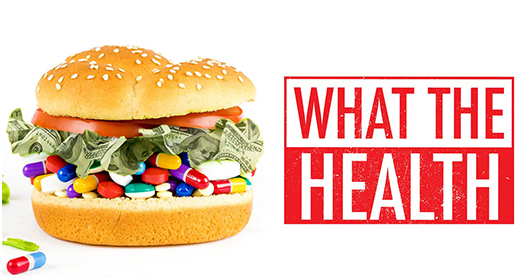Okay, we get the point – we all like and eat cheap food that just happens to be heavily marketed and processed. Our food is indeed controlled by large multinational corporations, complex structures churning out consumer goods via a production system far removed from the everyday city-dwelling folks who ultimately consume them.
It’s a great way to make money – we eat a lot of this food, and spend a lot in the process. And yes, we urgently need to be eating more of the fresh, the local, the sustainable and the vegetable.
And yes, a diet consisting solely of meat- or egg-based products would not be healthy. To that extent, the makers of What the Health are on the money.

What I take exception to, however, is the apparent need to humiliate people in this quest to highlight the dangers of bad food. There really is no justifiable need to make heartless calls to the helpline operators of vital agencies such as the American Cancer or Diabetes Societies.
Who would you call if you’d just been diagnosed with cancer? Who would you talk to if your diabetes medication had resulted in a serious complication? It’s these frontline helpers who really make a difference to the life of so many people. Rather than crank calls they deserve a heartfelt round of applause.
Asking simplistic questions based on slithers of scientific evidence, while representing it as absolute truth, is just wrong. There is no absolute truth when it comes to whether meat causes cancer or diabetes, just as kale is not the answer to every dietary shortcoming.
To determine if something causes cancer or diabetes, the hunt begins with the many thousands of people who volunteer to dutifully fill out questionnaires about what they eat, drink, take, do, think, earn and spend. These questionnaires are stored away and gather dust – often for years.
Enter a new breed of eager scientists (specifically epidemiologists, who specialize in large population data and complex statistical analysis), who pull those questionnaires out of the filing cabinet and investigate what became of those people. Some will have died, some got fat, some been diagnosed with diabetes or cancer, and so on. Running the questionnaires though a statistical analysis allows various risk factors to be identified and ruled out.
A risk factor is something associated with an increased chance of heart disease or cancer. And guess what? From the thousands of studies and millions of study participants, the same risk factors emerge again and again: meat, saturated fat, processed carbohydrates (including sugar) and total calories.
It’s not surprising, then, that these same foods and calories are linked to diseases, as each contributes in its own way to an unhealthy diet – and is possibly also indicative of a generally unhealthy lifestyle.
If diseases were a crime, then the crime scene would be a littered, greasy, sugary and sticky mess, with fast food wrappers, bags, boxes and containers strewn from the kitchen to the bedroom (and bathroom)! So yes, a bad diet is more than likely to get you in the end – and no, the health risks are not due to a single food or factor. It’s your total diet that matters.
To improve the health of many people the best advice they could listen to would not be to panic over alarmist messages such as those in What the Health. Rather, it would be to take many small and careful steps. This will involve preparing healthier meals – and they may contain meat. The aim is, of course, to eat more from the other end of the spectrum – vegetables, fruits, grains, legumes and unprocessed cereals.
To make this work, you – and yes, even me – need to cut back on the crap, starting right now. In the meantime, documentaries, blogs and the many forms of immersive social media will continue to inundate us with information overload. So what and who do you believe? Well, there is a little truth in just about every extremist view. But the human body is remarkably well adapted to consume, process, detoxify and manage the many chemicals and compounds in our daily diet.
Meat and eggs are just elements of what the human species has evolved to effectively digest and metabolize. Too much of either might well be detrimental in the long run, but a little of each can also be part of a healthy and balanced diet. Eat on and love life.
Now make up your own mind – What the Health can be seen on Netflix in most countries.

Professor David Cameron-Smith is a regular Fit Planet contributor. A transplanted Australian living in New Zealand, he obtained a PhD in nutritional biochemistry from Deakin University, and undertook postdoctoral training at the Royal Prince Alfred Hospital, Sydney. His research interests include the importance of nutrition in the maintenance of optimal health in an ageing population, and the impact of nutrition in regulating the function of muscles.
If you want more tried, tested and true news from the leading edge of health and fitness sign up to get Fit Planet insights and advice straight to your inbox.
Follow the freshest thinking @fitplanetmag.








